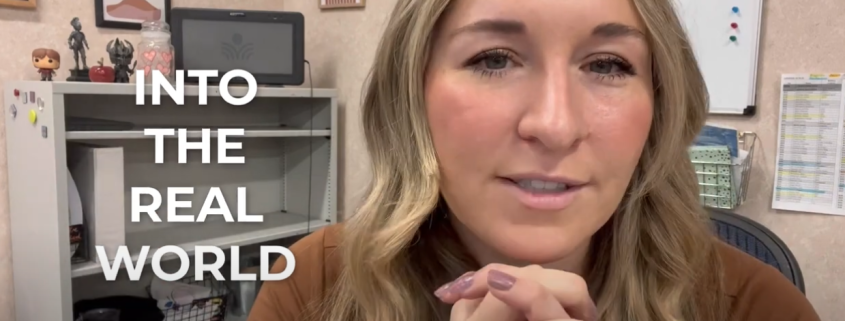Teacher profile: English teacher Andrea Michelle describes three critical life skills she teaches her students
Andrea Michelle, a high-energy educator who has been teaching high school for eight years, believes students can learn about more than literature in her English classes – they can learn critical life skills too.
In a recent video interview with the Student Research Foundation, she described how she elevates classroom discussions and experiences to a higher level.
The Question Andrea Most Loves to Hear from Students
When Andrea’s class was studying John Steinbeck’s novel Of Mice and Men, a student asked her, “When are we ever going to use this in real life?”
“I love that question,” Andrea says. “It gives me the opportunity to remind my students that although they’re unlikely to have a pop quiz about Of Mice and Men in real life, they are learning critical thinking skills when we discuss it in class. Yes, we’re using Of Mice and Men and some other classic literature to learn skills. I am focused on teaching the skills themselves. The kind of skills my kids are working on are things like critical thinking.”
Andrea builds critical thinking skills by asking students to identify a symbol or a theme in a text and to articulate their opinions about it.
“Their ability to communicate in that way is a skill that will transfer into whatever they do after they leave my classroom and go out into the real world,” Andrea explains.
How Andrea Helps Students Plan for Life after High School
“Students hate hearing the question `What are you planning to do after you graduate high school?’ from teachers like me,” Andrea says. “And I don’t blame them for that. That’s fair. I hated that question, too, because when I was in high school, I had no clue . . . It wasn’t until I was at a community college that I really started to get a good idea of what I wanted to do in real life.”
So Andrea is instrumental in helping her students, even high school freshmen and sophomores, consider options that can include not only college but trade schools and the military.
She explains, “For students from families without a heritage of attending college, the idea of college can seem like, `Something that other people do.’ But as I’m helping them navigate all of this, I try to give them all the resources I can for them to use those critical thinking skills and point them towards whatever option it is that they want to pursue in their lives.”
Using Resources from the Student Research Foundation
Andrea also makes extensive use of the resources that the Student Research Foundation offers her and her students.
“The Student Research Foundation has really awesome resources for my students and for me as an educator,” Andrea says. “They have articles on some of the more recent trends in education, so I can stay on top of them. They also have resources for students and parents . . . and they have scholarships available for the students. And it’s really cool to have the opportunity to work with my students to help them build critical thinking and to be able to connect with the resources they need that can help them build a future that they would love.”
National Student Research Study
If you are a high school educator, be sure to have your students participate in our national student research. This study benefits your students, educators, and non-profits working with youth. Fill out our quick and easy survey request form and get involved in this important work!
Resources
Career and College Planning Lesson Plan
Request study materials for your classroom
Related Posts
Texas Teacher Briana Stone Believes Communication and Cooperation Are Critical Skills
Black Teachers Needed More Than Ever
Great Ways to Integrate Career Planning into Your Classroom
Is It Time to Create a Career Research Center in Your Classroom?
More Teachers are Leaving the Profession
Why Teachers Who Expect Every Student to Love Every Lesson Are Setting Themselves Up for Failu











Leave a Reply
Want to join the discussion?Feel free to contribute!